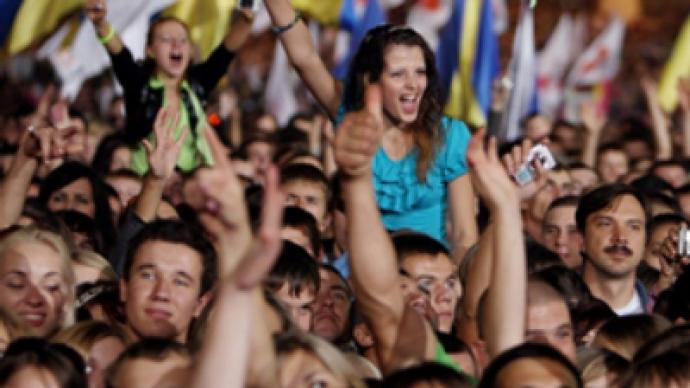Ukraine kicks off presidential campaign

On Monday, the Ukrainian President signed a decree finally setting the date of the next presidential elections on January 17 next year, officially kicking off the 90-day election campaign.
Unofficially, the campaign has already started as Ukrainian politicians have been trading accusations of all possible sins.
Presidential candidates now have three weeks to register themselves in this capacity and more than 10 politicians announced this intention on the day the campaign was launched. However, according to recent polls, only two potential candidates stand some chances. These are: Viktor Yanukovich – the leader of the Party of Regions, representing the pro-Russian eastern parts of the country; and Yuliya Timoshenko – populist politician of pro-Western inclination who started an independent political career after breaking away from a coalition with incumbent President Viktor Yushchenko.
Yushchenko himself has also said he would run for another term. Yet despite recent statements that he was absolutely sure he would win, observers estimate his chances as slim, as current support for Yushchenko hovers around three percent.
A dark horse in the race is former speaker of the Ukrainian Parliament Arseniy Yatsenyuk, who started his campaign very early and whose rating in late summer was at about 15%. At present, however, Yatsenyuk’s support is down at 8%, but with three months ahead, the situation can still change. Most probably Yatsenyuk is counting on a possible runoff in the election so that he can offer his support to the highest bidder – at present the former speaker is seen neither as a pro-Russian, nor as a pro-Western figure.
The starting campaign will most likely be very harsh, even by Ukrainian standards.
“We are facing an extremely harsh and non-correct elections campaign with beatings of activists, court wars and other unpredictable situations,” the Ukrainian press quoted former head of the Ukrainian Voters Committee Igor Popov. And this prophesy has turned out to be the case – Ukrainian politicians are using all forms of dirty play, even going as far as accusing opponents of pedophilia.
About two weeks ago, Ukrainian media supporting the Party of Regions reported that some women accused three top officials of Yulia Timoshenko’s bloc of raping children in the Artek summer camp. The media reported that the victims’ parents filed in a complaint with the police, but no actual proof was presented and, more importantly, the only person detained within the case has nothing to do with politics.
Another sign indicating that the story could be bogus is that the Russian mainstream media and tabloids have dwelled heavily on the story, and Russia has always been supportive of Viktor Yanukovich’s cause. The pedophilia story continues to develop, but even in its brief and early form it cannot be called anything but outrageous.
Despite the fact that many election analysts expect the struggle to become even more vicious, all of them agree that an “Orange Revolution” is not likely to happen again (In 2005, mass street protests in Ukraine’s capital Kiev ensured the victory of the pro-Western bloc and gave the presidential post to Viktor Yushchenko). The situation in the country has changed significantly. The people are disappointed in the incumbent president and in the Orange idea in general, and the state of the Ukrainian and global economy is drastically different to what it was four years ago.
The resource-based Ukrainian economy was hit especially hard by the world economic crisis and shows no signs of abating. The International Monetary Fund is expecting a 14% decrease in GDP in 2009. Thus, both the Orange bloc now in power and the Party of Regions with support in industrial Eastern Ukraine have much fewer resources at their disposal.
The same is true about the major forces behind the Ukrainian political struggle. With oil prices staying relatively low, Russia cannot afford as much support to the Party of Regions as it used to provide. On the other hand, the new administration in the US is also unlikely to meddle in Ukrainian policy as much as the Neocons from George Bush’s office used to…
…All of which leaves Ukrainians cash-strapped, aggressive, and on edge – the perfect qualities for an exceptionally interesting campaign.
Kirill Bessonov, RT












